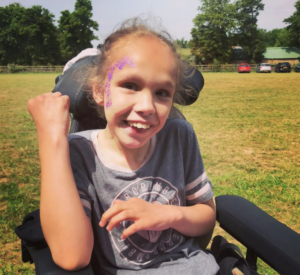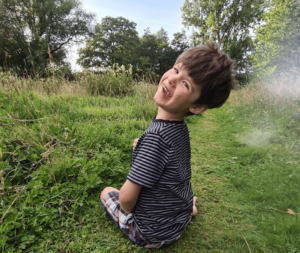Five years on the parents of children who helped legalise medicinal cannabis are back at square one – forced to break the law to access the potentially life-saving treatment.
In 2018 Emma Appleby travelled to Holland with journalists from the BBC as she attempted to bring back medicinal cannabis oil illegally for her daughter Teagan.
It was a risk, but a necessary one, to raise awareness of the fact that cannabis oil was the only thing that would help Teagan, who lives with severe treatment-resistant epilepsy, and sometimes suffered up to 300 seizures a day.
Their story was one part of the high-profile campaign that ultimately led to cannabis being rescheduled to allow it to be prescribed for medicinal purposes in November 2018. Teagan was among the first people in the UK to get a legal prescription.
But five years later, Teagan is about to turn 13, and Emma is once again faced with losing access to the treatment that has been so transformative for her daughter.
‘Back at square one’
In June, after a year of uncertainty over its supply, Bol Pharma stopped manufacturing Celixir20, a high-CBD cannabis oil, which was prescribed to around 30 children and young people with epilepsy in the UK.
Teagan had been taking Celixir20 for three years, having found it to be the most effective product for reducing her seizures and improving her overall quality of life. While there are other whole-plant cannabis oils available, the exact make-up of each one differs, and doctors don’t recommend switching medications in a patient with epilepsy when they are responding well – with some experts even saying changing cannabis oils can be ‘highly unsafe’.
Emma has been using what oil she has left sparingly to try to make it last, but she has already seen an increase in Teagan’s seizures and aggression in recent weeks.
“It’s gutting. I’m pretty much back where I was five years ago,” she says.
“She’s not in hospital, which is the main thing, but her quality of life is starting to suffer again. We’re going to have to go back to Bedrolite and Bedica, which isn’t the best for her, but even getting a prescription for that is going to be a nightmare at the moment, so we may be forced to go back to breaking the law.”
Teagan’s paediatric neurologist is about to retire and the only other doctor prescribing for children with epilepsy is not taking on any new patients.

Teagan Appleby.
It’s a life and death situation for Teagan, Emma explains.
“This medication keeps Tegan alive; it’s imperative that she has it. We nearly lost her in 2018 before we started cannabis oil, and when we ran out in the first lockdown, we nearly lost her again,” she continues.
“It’s hard enough having a disabled child to care for and trying to find £2,000 a month to pay for her medication, but now we’re faced with the fear of not being able to get a prescription and having to break the law just to keep your child safe.”
She adds: “Don’t get me wrong, I’ll do it in a heartbeat because she’s my world, but I shouldn’t have to be in this situation.”
Why are paediatric neurologists not prescribing?
Teagan’s NHS neurologist is supportive of her taking cannabis and even wrote a private prescription to release the oil when it was confiscated by customs in 2018, but his NHS trust wouldn’t support him to continue prescribing.
Even though cannabis medicines have been legal to prescribe for almost five years, for various reasons, paediatric neurologists are reluctant to put their head above the parapet and do so. And even when they are willing to, many are unable to get the backing of their NHS bosses.
Cannabis Health first reported on this issue back in 2021, highlighting that there was only one consultant prescribing to children with epilepsy in the UK. Despite the efforts of parents, campaigners and advocates, little has changed.
Matt Hughes, co-founder and director of Medcan Family Foundation, which supports the families of children with epilepsy, puts it down to challenges with current policy and guidance from governing bodies which prevent consultants from coming forward.
“It’s incredibly sad that after five years since the change in law, which came about because of campaigns from children, we have seen very little progress, and in recent weeks a step backwards,” says Matt, whose son Charlie has a form of epilepsy known as West syndrome and was also prescribed Celixir until recently.
“Current policy and guidance from governing bodies hinders progress for paediatric clinicians. Despite some agreeing cannabis medicines are benefitting their patients, they feel unable to engage. It’s incredibly upsetting and infuriating for families who are directly impacted, who themselves feel unable to have open conversations with their NHS clinician about the use of cannabis for their child.”

Charlie Hughes
Many blame guidance from the British Paediatric Neurology Association (BPNA) – of which the majority of paediatric neurologists in the UK are a member – which doesn’t recommend the prescribing of products containing THC due to a ‘lack of evidence of safety or efficacy’.
This lack of support places doctors in the difficult position of having to go against their colleagues and potentially put their careers on the line.
Short-term solutions and ‘sticking plasters’
Cannabis Health understands that some cautious progress is being made behind the scenes in regards to bringing on new paediatric prescribers.
In the meantime, Professor Mike Barnes, the neurologist who obtained the first full licence to prescribe cannabis oil to Alfie Dingley in 2018, confirmed that he has gone back on the specialist register to prescribe to those children with existing prescriptions as a short-term solution.
“I am pleased that I am able to help these children but it is only putting a sticking plaster over the problem,” he tells us.
“The real problem here is the intransigent attitude of the BPNA. I simply do not understand their objection to allowing children to at least try cannabis when all else has failed. What is stopping them? Pride? Arrogance? Inability to admit they are wrong? I hope eventually their attitude changes and they can work to help children rather than failing them.”
Meanwhile, Robin Emerson, founder of the Jorja Emerson Centre, says he has been meeting with paediatric neurologists to try to convince them to come on board in the long term.
“We have been engaging heavily with various different paediatric neurologists to try and get them on board,” says Robin, whose daughter Jorja also has a rare form of treatment-resistant epilepsy.
“A lot of their fears are around safety and monitoring. They’re concerned about the responsibility they are taking on and having a safe environment to monitor [these children] in.”

Robin Emerson, founder of the Jorja Emerson Centre
“The problem is most don’t understand medical cannabis,” Robin continues.
“Every one of them is worried about what will happen to their NHS careers. I think we need to have open conversations, not only with paediatric doctors, but doctors in general and the fear that is put into them about being part of something like this.”
Robin has also tried to engage with the BPNA to discuss its stance on the prescribing of unlicensed cannabis medicines.
“They simply turn around and say a full randomised control trial (RCT) needs to be completed on a market authorised medicine. That’s not an answer. That’s an answer for 10 years down the line,” he says.
“We have to look for a real solution to be able to give these children their medication in a safe and controlled manner. We have to be able to get that access now, rather than having to wait for a drug to obtain full market authorisation, which we don’t have to do for so many other drugs. That’s part of the hypocrisy that’s in play.”
Calls for more ‘clinical evidence’ met with pleas for compassion
Regulators repeatedly call for more clinical evidence and RCTs before cannabis can be recommended for prescription on the NHS. Despite the promise of two RCTs to compare the effects of medicines containing CBD, and CBD with THC, there has been no further updates on the status of these from the National Institute for Health and Care Research (NIHR).
Even if they were to begin imminently, RCTs are lengthy and would mean some children coming off the medication that they rely on and being given a placebo, which could place their lives at risk. Meanwhile, a growing database of real-world evidence finds that cannabis is safe and effective for reducing seizures and improving quality of life in epilepsy.
“We completely understand the concerns of clinicians in wanting further data, in particular – safety; we want only the best for our children. However, RCTs are yet to begin, and are many years away from completion,” says Matt.
“This leaves families in an untenable situation given that primary treatments, including brain surgery, have failed to control their child’s seizures.”
Meanwhile, many anti-epileptic medications are unlicensed and routinely prescribed ‘off label’ through the NHS, despite not having gone through RCTs.
As Emma says: “Teagan’s rescue medication is so strong it melts plastic, and that goes straight into her bloodstream. Why is it okay for her to have that unlicensed medication, but I can’t give her a plant?”
Robin is calling for some form of compassionate access to help children imminently while these lengthy trials are carried out.
“I’ve always said that we need a two-pronged approach to this,” he says.
“We need to move forward with the clinical research, but there also needs to be more compassionate understanding from clinicians, given that we are talking about extremely ill children with debilitating conditions and life-limiting conditions.”
He adds: “It’s quite sad that we don’t have a single paediatric neurologist willing to come forward on a compassionate basis to help these children.
“Children like Jorja were the reason medical cannabis was legalised, but now they’re being left behind.”
Three NHS prescriptions
In the background to all this is the fact five years on we are still no closer to the NHS access which many expected on 1 November 2018. Despite the fact that three known children in the UK already have NHS prescriptions for unlicensed cannabis medicines, dozens of others are still forced to raise thousands of pounds a month to pay for them privately.
Last week parents from the campaign group End Our Pain once again called on Number 10 and the Department of Health and Social Care (DHSC) to review the policy. On Wednesday, 12 July, a video of 12-year-old Ben Griffiths having a distressing seizure after running out of THC was displayed outside Westminster.
Ben cannot survive without his medical #cannabis medication that he is being denied free #NHS access to.
This short film is driving around Westminster to show the huge difference cannabis makes to his health. He has to pay up to £2,000 a month to stay alive. pic.twitter.com/lStay1mDzS
— Boisterous Ben (@BenBoisterous) July 12, 2023
Ben’s mum, Joanne Griffiths, said: “We have been passed from pillar to post for nearly five years now since the law was changed in November 2018 to allow medical cannabis to be prescribed. The Secretary of State, the NHS and the leading doctors are all standing by and watching us have to raise thousands of pounds to secure access to the only medicine that helps our children.
“In addition, we are constantly being promised trials that never seem to happen. If the medicine wasn’t safe or didn’t work, why was the law changed and why are three affected children getting the medicine on the NHS? The government only changed the law after taking advice from its experts. We have the best evidence of all, the evidence from our own children.”
She adds: “Everyone involved just seems to blame everyone else. Caring for a very ill child is incredibly tough in its own right. To have to find thousands of pounds every month on top of that is intolerable.”
In need of an immediate solution
Medcan works closely with the Canadian Collaborative for Childhood Cannabinoid Therapeutics (C4T) in Canada, where doctors adopted a harm-reduction approach to prescribing cannabis medicines for children, something which he is advocating for here.
The foundation also recently launched a new campaign, #SaveTheUnicorn, which is calling on MPs to support the call to action in its manifesto and find an immediate solution for children with rare and severe forms of epilepsy who are currently without access to effective medicines.
“Policy is not reflective of real life, where unregulated and illicit cannabis medicines are easily accessible. Families don’t want to break the law and are very frightened, but they can’t abandon their child when all else has failed them,” says Matt.
“We need to look beyond the standard to find innovative solutions whilst we await trials to commence. One primary solution which has proven to be effective in Canada is a harm-reduction model to prescribing.
“Children and their families have been through unimaginable trauma already, now left to access oils illegally, unregulated and without clinical oversight, putting their child at risk. Medicinal cannabis is prescribed as standard to epileptic children in countries like Canada, Australia and the Netherlands. It has to change. The government and Department of Health and Social Care must do better to stop failing families.”
One of the campaign’s young spokespeople, 13-year-old Jasper Jones, adds: “A lot of people will be surprised to hear a kid talking about cannabis, but this isn’t about drugs, it’s about medication. It is the only medication that has worked for me. I want MPs and doctors to understand what it feels like when they tell us that we can’t have the medication we need to stay alive.”
NIHR ‘stands ready’ to support research, says government
According to the DHSC, until the evidence base improves, prescribers will ‘remain reticent to prescribe’ and no decision can be made by the NHS on routine funding.
Since the law change, the NIHR has highlighted this area as a ‘research priority’ and regulators and policymakers have repeatedly urged manufacturers of unlicensed products to come forward with research applications to help build the much-needed evidence base.
The DHSC itself is also said to be ‘working closely’ with regulatory, research and NHS partners to establish clinical trials to test the safety and efficacy of these products.
A spokesperson said: “In 2018, we changed the law to allow specialist doctors to prescribe cannabis-based products, where clinically appropriate, and make it easier to conduct research on these products.
“Licensed cannabis-based medicines are routinely funded by the NHS where there is clear evidence of their quality, safety and effectiveness.
“We are taking an evidence-based approach to unlicensed cannabis-based treatments to ensure they are proved safe and effective before they can be considered for rollout on the NHS more widely. Our medicines regulator and the NIHR stand ready to help researchers develop applications.”
Want more stories like this delivered directly to your inbox? Sign up for our free weekly newsletter here.
- Parents to launch Intractable Epilepsy charity in parliament
- Up to a third of UK children receiving end-of-life care may be using cannabis
- Access to medical cannabis is just “the tip of the iceberg” for families
- Watch: families for medical cannabis – Mitchell and Caroline
- Call for UK families to take part in cannabis and childhood cancer study
The post ‘Our children have been left behind’ – How UK medical cannabis policy failed families appeared first on Cannabis Health News.
Go to Source
Author: Sarah Sinclair

